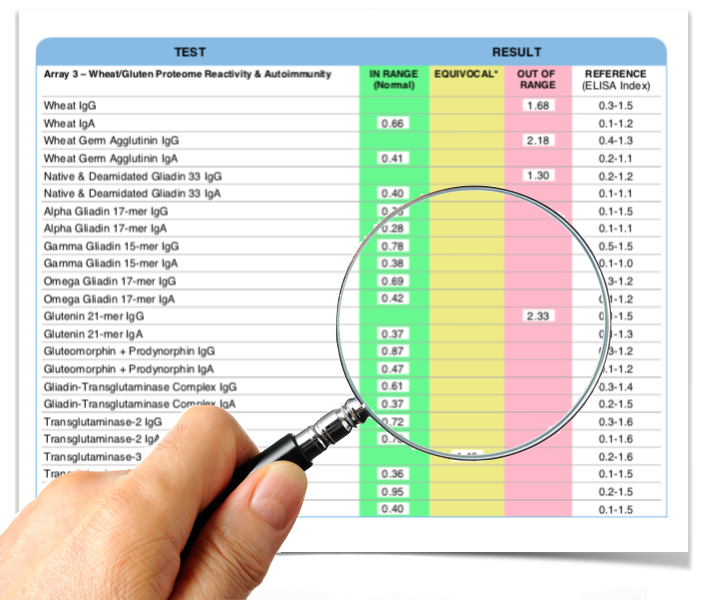 Food intolerance testing has been condemned in the mainstream media. They question whether it’s valid or not. Although they make some good points, the truth is food intolerance testing can be a good tool to help patients discover what may be giving them some health problems.
Food intolerance testing has been condemned in the mainstream media. They question whether it’s valid or not. Although they make some good points, the truth is food intolerance testing can be a good tool to help patients discover what may be giving them some health problems.
Last week, I wrote about the importance of identifying food intolerances. Identifying food intolerances and eliminating them can help prevent chronic illnesses like autoimmune diseases and it helps to improve your health and quality of life.
The gold standard for identifying food intolerances, at the time of this writing, is doing a proper elimination and reintroduction diet. However, analyzing the blood for antibodies against specific foods (IgA and IgG food intolerance testing) gives the health practitioner and patient certain advantages:
Fast results. Doing an elimination and reintroduction diet properly can take a total of about three months to complete. Even after doing that there can be some uncertainties in what you are intolerant to. Getting your blood drawn and having it sent to a reputable lab for analysis takes about three weeks.
Can help provide more certainty. If you are uncertain about a specific food or foods you may be intolerant to, the food intolerance testing can help fill the voids and provide you with more certainty.
One disadvantage of food intolerance testing is that it can be PERCEIVED as expensive. For example, Cyrex labs does a very good wheat and gluten intolerance test for over $300 US and bundles three food intolerance tests for about $1,000 US. To put this into perspective my mechanic charges me about $1,500 to get new tires put on my truck and a patient of mine the other day was looking at a pair of boots for $400. Sometimes you have to ask yourself what’s your health worth?
Another disadvantage is that the food intolerance testing isn’t 100% accurate. (1)
How valid are these IgA/IgG food intolerance tests?
First and foremost, I don’t know any lab test out there that is 100% accurate. Every test has false positives and negatives. Is an IgG/AgA food intolerance lab test any different? No.
In saying that, there are some important things to look for when deciding if any lab test is worth your money. In order for a test to give you reliable information you can use for effective treatment it should have the following attributes:
There should be a good reason to do the test based on the current understanding of human physiology and the specific disease processes the test is used to identify.
- If IgG antibodies against a specific food and tissue are increased it indicates the immune system can not tolerate that food and tissue. The first antibody to be produced when there is an intolerance to food is IgA. (2)
The test results should have been published in a peer reviewed journal and replicated by other research groups.
- IgA and IgG food intolerance testing meets this criteria. (2)
The test should produce the same results or close to the same results each time you run the sample (blood, urine, saliva, etc.)
- Based on a lot of the studies I have looked at with IgA and IgG food intolerance testing it looks like the answer is no. Some studies conclude this type of testing is consistent and reproducible and some say it isn’t. So why is there such a difference?
Three factors that are important to make sure the IgA and IgG food intolerance test is more accurate:
- The proteins in foods should be purified (isolated) from other components in the food to limit false positive results.
- The lab should be running the sample twice to make sure their results are consistent and reproducible.
- The lab should be testing food in a raw or cooked state based on humans would eat it. Cooking changes the protein structure in food. It doesn’t make sense to test the protein in raw meat does it? Yet there are labs that test these types of food in the raw state.
I have to admit I have seen some patients bring in their IgG/IgA food intolerance lab results from a variety of labs with food intolerances to LOTS of foods. Even whole foods like fruits, vegetables and meat. So I question whether the labs doing these tests have methods and procedures to meet the above criteria.
There is one lab that does meet the above criteria. The lab is called Cyrex Labs. The chief scientific director is Dr. Aristo Vojdani. Dr. Vojdani has a Ph.D. in microbiology and clinical immunology and has published over 100 peer-peer-reviewed articles in scientific journals.
My recommendations for you to determine if you have food intolerances
Again, the gold standard for identifying food intolerances for yourself would be to do a proper elimination diet for 30-60 days and then reintroduce each food you have eliminated one by one every three days. This process can take approximately three months or more. For most people, they need to seek some professional guidance to carry out this diet effectively.
If you’re the type of person who isn’t ready to adhere to this arduous process, then I would recommend you get the IgA/IgG food intolerance lab test done. Get a health professional registered with Cyrex Labs to order you a lab kit. You will need to get your blood drawn from lab willing to do this work for you and your health professional.
Cyrex Array 3 (wheat/gluten IgA/IgG lab test)
If you know you are 100% gluten free already and you are committed to never eating it, then there is no point in ordering this test. It’s a great test, but why waste your money on it. However, if you are still eating some gluten or want to enjoy it occasionally then I would highly recommend you get this test done. There are many serious health conditions either associated with or directly related to eating gluten (‘Is Gluten Bad For You?’). If a patient of mine tests positive for one or more of the proteins in this test, I will advise them to remove wheat/gluten from their diet for the rest fo their life.
Cyrex Array 4 (proteins in dairy, alternative grains, coffee, etc.)
Patients who have celiac disease or a non-celiac gluten intolerance are more likely to react to dairy proteins and some of the other proteins in this lab test. I recommend this test for patients if they have tested positive to the Cyrex Array 3 test. I also recommend this test to patients who have done the elimination diet and are still unsure about whether they are reacting to dairy or some of the other foods in this test. If a patient tests positive for one or more of the foods in this test, the patient won’t necessarily have to remove that food from their diet for the rest of their life. We may remove the foods they are reacting to in this test while they are treating some other underlying gut problems. We may bring those same foods back into their diet later and then retest them with Cyrex Array 4 again.
Cyrex Array 10 (multiple food intolerances)
This test looks at all other kinds of foods you typically eat like fruits, vegetables, meat, etc. We would recommend this to patients who are still struggling with health issues even after addressing underlying gut issues or other health problems. Maybe the patient will have to remove multiple foods just to feel better while they are working through at addressing other underlying health problems.
Summary
There is a lot of controversy, misunderstanding, and misinformation regarding IgG/IgA food intolerance testing. Hopefully, this article helped give some clarity on this subject matter.
Cyrex Labs has great information about their tests on the website. So I would encourage you to visit their website if you want more information about that.


Just curious if labs can test gluten intolerance when consumed as sourdough bread that has undergone 24-36 hours of fermentation thus easing digestion. I don’t know if I can eliminate bread for life! But I have been making sourdough for years and I could definitely promise to only eat gluten in that form.
Hi Haley,
I would assume the labs could test for gluten intolerance based on your scenario, but Cyrex labs would be the best place to ask that question.
Dr. Collins
Hi! How would I go about getting tested for a gluten issue? The labs site on your page seems a little confusing.
Hi Nick,
Getting testing probably depends where you live. Where I live, the patient would have to consult a practitioner like a naturopath or functional medicine practitioner to order the kit for the patient. The patient, in turn, makes an appointment at a lab that can draw their blood and prepare it properly to send back to Cyrex labs in the United States to get the test.
Where do you live, perhaps I can recommend someone for you?
Dr. Collins
My son completed the Cyrex 10 Array and results indicated greater than 25 food intolerances, including nearly every meat, most vegetables, and several fruits. I will be meeting with a holistic provider for interpretation. What are possible explanations for multiple food sensitivities? It is unrealistic to eliminate all these foods. I had hoped the test would provide more clear guidance.
Hi Amy,
Multiple food sensitivities be caused by a number of things. For example, your son could have an underlying gut infection that is causing “leaky gut”. So that means the gut barrier is compromised and is letting food proteins into the blood and it could be creating an overactive immune response. Speaking of which, your son’s immune system may not regulating properly. That’s another reason, and there are many causes for that. As well, certain proteins in one food may look like other proteins in another food so his immune system can see them as the same. That’s called cross reactivity. If you’re seeing a naturopath or functional medicine practitioner, they should be able investigate this for you and figure it out over time.
It’s a daunting task when eating for sure when people have multiple foot sensitivities. Keep in mind no lab test is perfect and elimination and reintroduction of foods is still the gold standard for determining food intolerances. As stated, however, your practitioner, might have to dig deeper to determine if there is a deeper underlying issue to take care of first.
Hope this helps a little and good luck.
Dr. Collins